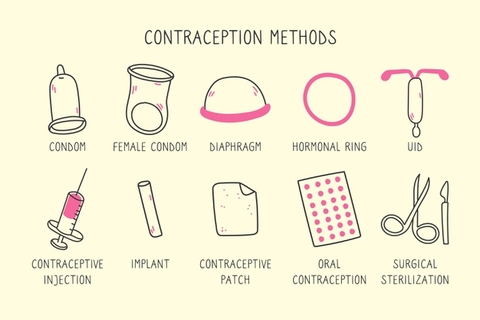Choosing Your Contraception Method

There is no one contraception method that works for everyone, our bodies react differently to different contraceptive methods, and each one has its pros and cons.
There are various types of contraceptive methods that work on preventing unwanted pregnancy in different ways. We can categorize them into natural methods, hormonal methods, barrier methods, non-hormonal non-barrier methods, emergency contraception, and permanent methods (sterilization).
It's worth noting that contraceptive methods do not require a doctor's prescription in Lebanon. But permanent procedures require that you do a lot of convincing with your doctor.
Natural methods
- Fertility awareness/calendar method: These methods focus on knowing which days of the month you are able to get pregnant (fertile), often based on basal body temperature and cervical mucus. To avoid getting pregnant, you do not have sex on or around the days you are fertile, or you use a barrier method of birth control. Check out this video that explains how the calendar method works. You can also use many of the accessible phone applications that help you track your periods and provide insight on your most fertile days (in case you are trying to get or not get pregnant).
- Pulling out: Also known as withdrawal, this method requires that the partner with a penis pull out of the vagina before they ejaculate/orgasm. This requires that the person be able to practice self-control and be in tune with their body, making this a risky and unreliable method of contraception, especially considering that it’s not just cum, but pre-cum as well, that contains sperm.
Hormonal methods
- Combined oral contraception pill
It contains a combination of two hormones similar to those produced naturally by the body; progestogen and oestrogen. Taking it every day is important to keep its efficiency high. This video goes in depth about how pills work and their usage.
- Progestin-only pill
If your body does not like estrogen for health reasons, or you are pregnant, progestin-only pill is your go to among hormonal choices. You can learn more about the "mini-pill" here.
- The patch
Just as the name suggests, it is a small patch that you can stick on different parts of your body, and it has the same function as the combined pill. If you do not mind the possibility of it being visible, and would rather not be reminded to take the pill on the daily, the patch could be a great option for you.
- The vaginal ring
Another contraceptive method that mimics the work of the pill, the vaginal ring stays in the vagina for 3 weeks at a time, after which you get a break for a week, then insert another ring after. Here is a video that demonstrates how the ring works.
- The injection
Commonly referred to as Depo-Provera, the injection is administered by a professional every 3 months. It is one of the heavier hormonal methods on the body, but it works for many people, especially if they prefer longer-term hormonal methods. You can learn about how the injection works here.
- The implant
Not many people know about the implant in our region, as it is not very common. However, the implant provides a good long-term hormonal solution. It is inserted by a professional in the fatty part of your arm and can stay for years. It can be removed any time at your convenience by a professional tool. Get to know more about the implant.
- Hormonal intrauterine device (IUD)
A lot of people prefer the IUD out of all hormonal methods for few reasons: its hormonal impact is limited to the scope of the uterus as it doesn't go through the blood, it is a long lasting contraceptive method, and it is not visible to others. If you do not mind its more expensive but one-time budget, and you care about all these perks, take a look at the hormonal IUD as an option.
Barrier methods
- External condoms: usually made out of latex, external condoms are made to be placed on a penis to prevent bodily fluids from being exchanged between sexual partners.
- Internal condoms: they are made out of polyurethane and are inserted into the vagina.

Pros:
- Only methods to protect against sexually transmitted infections (STIs)
- Only need to be used during sexual intercourse
- No side effects
Cons:
- Can sometimes slip off or break if not used properly (make sure to use water-based lubricants if using latex condoms)
- Some people are allergic to latex (non-latex condoms are available but might be harder to find)
- Diaphragm: It is probably one of the most commonly used methods by older generations in the region. It can be inserted into your vagina by you or your doctor. It acts as a physical barrier preventing sperms from getting in, and can be accompanied by spermicides to increase its efficiency.
- Cervical cap: It is very similar to the diaphragm but blocks the cervical opening to prevent sperm from coming in. It can also be accompanied by spermicides. It needs to be fitted by a doctor first.
If you can to learn more about these two methods, make sure to check out this video.
Non-hormonal non-barrier methods
- Copper intrauterine device (IUD): a small, T-shaped piece of plastic with copper coiled around it that a doctor or nurse places inside a person's uterus. It prevents sperm from fertilizing an egg. It can last for up to 10 years.
- Pros:
- Does not interrupt sex
- Is 99% effective at preventing pregnancy for 5 to 10 years
- Fertility returns immediately after removal
- Can be used as an emergency contraception method
- Can be used by people who cannot take hormonal contraceptive methods
- Cons:
- Does not protect against STIs
- Periods may become heavier and longer
Take a look at how a copper IUD works inside the body,
Emergency contraception pill
Take a look at our thorough emergency contraception section here!
Permanent methods (sterilization)
- Tubal ligation involves cutting, sealing, or blocking the fallopian tubes which allow the egg to move from the ovaries to the uterus. People who get this procedure done still ovulate and get periods. It is irreversible as a method, so one must be sure they do not want biological children before taking such a step. It is also an expensive procedure and many insurances in Lebanon do not cover it.
- Vasectomy involves the cutting or sealing of the vas deferens which are the tubes that carry sperm from the testicles to the penis. It is often a reversible method, and takes around 20 minutes to perform as it is not invasive. Culturally, however, many men refuse to undergo this procedure believing it has an impact on their manhood.
You can learn more about these sterilization methods in this video.
What influences our choice of contraceptive method?
A lot of factors influence the method of contraception a person uses, including cost, effectiveness, availability, protection from STIs, certain health conditions, long term vs short term protection, and personal beliefs. If you are worried about any of these methods and want some help deciding, do not hesitate in contacting our sexuality hotline counselors at 76680620.
How accessible is the method?
- Natural methods such as the calendar method and pulling out/withdrawal are the most accessible methods of contraception with zero cost. However, the calendar method requires careful tracking of a person’s period cycle in order to determine their fertile days as well as a very regular cycle. This method has low effectiveness and does not work if you have an irregular cycle. While pulling out is slightly more effective than not using any method at all, there still is a high risk of pregnancy since it required that the partner with a penis be very aware and in control of themselves during sex in order to pull out on time. Pre-cum also contains sperm and could lead to pregnancy even if the person pulled out before ejaculation.
- Being able to obtain a contraceptive method over the counter (without a doctor’s prescription) makes condoms and oral contraceptive pills two of the most accessible and widely used methods of contraception. Condoms, both internal and external ones, have the added benefit of being the only methods that protect you from STIs in addition to preventing pregnancy. Some clinics and nongovernmental organizations also give them out for free. Some sexual partners refuse to use a condom during intercourse because they say it makes sex less enjoyable, but there are different types and sizes of condoms you could try if you’re not comfortable. Another thing would be to make sure there’s proper lubrication to make things go smoother and be more enjoyable for everyone.
- The injection and the patch can also be found at some pharmacies, while diaphragms, cervical caps, implants, and IUDs would require a visit to a medical professional to get them fitted or administered.
Do I want long-term protection?
However, with prices of these products constantly on the rise, some are starting to consider other more long-term methods such as the IUD. The copper IUD in particular can be obtained in some clinics for low or no cost. It’s important to keep in mind that the IUD (both copper and hormonal) need to be administered by a trained doctor or nurse. Some of the things that make people with uteruses hesitant to try the IUD include fear of being judged or denied by healthcare professionals in the case of being unmarried and myths about IUDs leading to infertility.
I know that I never want to have kids/ I already have kids and do not want to have any more
People who have decided not to bear kids can opt for more permanent procedures that prevent pregnancy such as tubal ligation or vasectomies. However, your decision to get such a procedure could be faced with a lot of challenges from the people in your life as well as doctors who have been reported to refuse performing these procedures particularly on unmarried women or women who have never had children.
Personal issues that could affect the type of contraception you opt for could be previous experiences with certain methods, health conditions that would not allow for you to take hormonal contraceptives, age, smoking status, among others. It’s good to keep in mind that no method works for everyone, and that’s okay. To discuss your options in more detail, have a chat with one of our counselors on the sexuality hotline! You can also check out Marsa's booklet on navigating different contraceptive options.